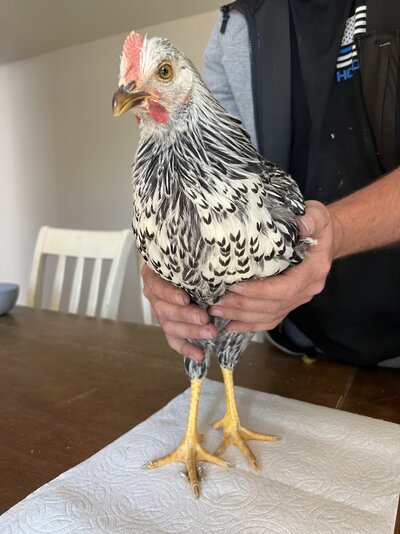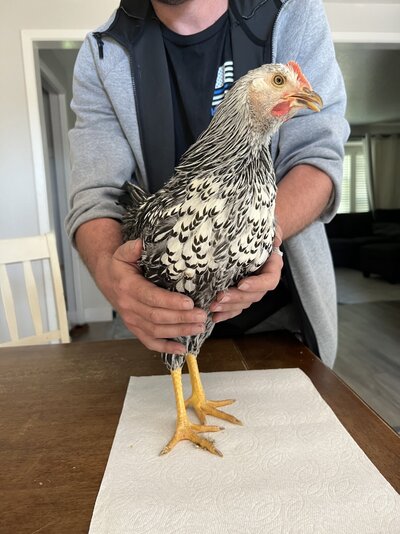They really aint that hard as I raise wyandottes lolThank you for the response! That’s what I thought but I’ve heard that they can be difficult to sex.
Navigation
Install the app
How to install the app on iOS
Follow along with the video below to see how to install our site as a web app on your home screen.
Note: This feature may not be available in some browsers.
More options
You are using an out of date browser. It may not display this or other websites correctly.
You should upgrade or use an alternative browser.
You should upgrade or use an alternative browser.
SLW single comb. Cockerel or pullet?
- Thread starter MoiraDawn
- Start date
- Thread starter
- #17
Hey everyone! Me again!! They are 13 weeks now!! No crowing yet! But they’re combs and waddles are very much red! This is the main one I had questioned. Are we leaning more towards hen? Or rooster now?
Attachments
I'm not sure which hatchery my LFS orders from.. but it's not uncommon on hatchery stock.. as I've gotten them before as well. And yes they are still Wyandotte indeed just with the wrong comb type for the SOP. I bet it would make a difference in heat tolerance.But where do you get single-combed SLWs?
Breeding only rose comb for several generations can cause slow sperm motility, and ultimately *can* reduce or eliminate fertility is the reason why some keep single combs in their stock.
Since straight comb is the absence of another.. it only takes one copy of rose to show as rose.. but breeding those together would give 50% straight combs I think, (using that punnet square).
I saw a half-right explanation of rose comb & fertility, and a completely correct explanation of the genetics for single vs. rose comb.That entire comb type is a myth no where was that ever proven...
What part are you refering to?
Um, sort of.Breeding only rose comb for several generations can cause slow sperm motility, and ultimately *can* reduce or eliminate fertility is the reason why some keep single combs in their stock.
The way I've seen it explained:
Homozygous (pure) rose comb roosters have defective sperm motility.
Heterozyotes (one copy of the rose comb gene) are fine, and so are ones with single combs.
So it's not how many generations, it's whether a specific rooster is or is not pure for the rose comb gene. (Having the breeding rooster be pure for rose comb is less likely to happen if the breeding flock always contains single comb chickens as well, and more likely to happen if you only breed from chickens that show a rose comb.)
The defective sperm motility means the rose comb rooster needs to mate with each hen more often to assure fertility, which calls for a different ratio of roosters to hens. That also means that a flock with both kinds of roosters (heterozygous rose comb and homozyous rose comb) will have more chicks sired by the heterozygote, and less by the homozygote. But I have never read of complete infertility being more common with rose comb chickens than with any other kind of chicken.
Last edited:
That is simply not true in the slightest. You are more than welcome to read a paper that concludes this.That entire comb type is a myth no where was that ever proven...
"The studies done on comb type and its influence on behavior and fertility have shown that the comb genotype does indeed have an impact. Particularly in rose comb breeds, the gene for heterozygous rose comb is linked with poor reproductive ability. There are several factors that appear to contribute to this. RR males are less successful at courting females. They have a higher percentage of sterile matings, and have a much shorter duration of fertility. No difference was found in the fertility of RR females. From recent studies it appears that the biggest problem may be with sperm metabolism and motility, although the exact cause for low fertility in rose comb breeds has yet to be determined for certain." Source
And whoever wrote that conclusion has a typo:That is simply not true in the slightest. You are more than welcome to read a paper that concludes this.
"The studies done on comb type and its influence on behavior and fertility have shown that the comb genotype does indeed have an impact. Particularly in rose comb breeds, the gene for heterozygous rose comb is linked with poor reproductive ability. There are several factors that appear to contribute to this. RR males are less successful at courting females. They have a higher percentage of sterile matings, and have a much shorter duration of fertility. No difference was found in the fertility of RR females. From recent studies it appears that the biggest problem may be with sperm metabolism and motility, although the exact cause for low fertility in rose comb breeds has yet to be determined for certain." Source
"the gene for heterozygous rose comb is linked with poor reproductive ability."
"Heterozygous" does not belong in that sentence, since the homozygotes are the ones with problems (as shown in the rest of that paragraph, and the studies recounted in the body of that paper.)
@Rhodebar Lover I see that you copied it exactly from the paper, so my criticism refers to the actual author of the paper. They really needed to proofread that!
Yeah that is bizarre. I liked the sources of it though and I think their logic is correct. I assume that was an accident! Perhaps it might be best then just to look at their sources to further research the trend but I am on your page that rose combs are linked infertility and that the wording is wrong.And whoever wrote that conclusion has a typo:
"the gene for heterozygous rose comb is linked with poor reproductive ability."
"Heterozygous" does not belong in that sentence, since the homozygotes are the ones with problems (as shown in the rest of that paragraph, and the studies recounted in the body of that paper.)
@Rhodebar Lover I see that you copied it exactly from the paper, so my criticism refers to the actual author of the paper. They really needed to proofread that!
- Thread starter
- #39
Probably a cockerel, but I would give it some more time.
TheOddOneOut
🌧️🌧️🌧️
pullet imo
New posts New threads Active threads
-
Latest posts
-
-
-
Open Contest May Madness, a Random Funny Posting Contest
- Latest: Antiocheggers
-
-
-
-
Latest threads
-
-
Installing windows backwards in Midwest
- Started by Rachelz
- Replies: 0
-
-
Splash australorp x Isabel Leghorn??
- Started by Leuceaux
- Replies: 0
-
-
-
Threads with more replies in the last 15 days
-
-
-
Open Contest BYC's 4th of July Star Spangled Hatch-Along—Stars, Stripes, & Feathers, a Text-to-Image Contest
- Started by Debbie292d
- Replies: 89
-
-
-






